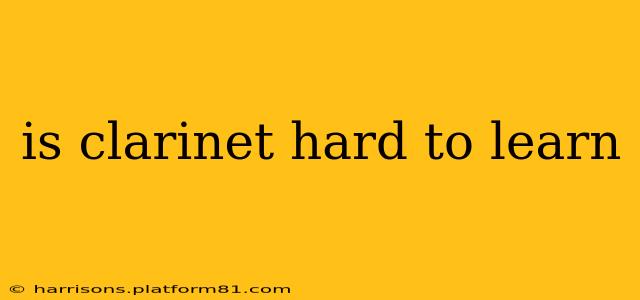The question of whether the clarinet is hard to learn is a common one, and the answer, like most things in life, is nuanced. It's not simply a "yes" or "no." The difficulty of learning the clarinet depends on several factors, including your musical background, your natural aptitude, your dedication to practice, and your learning style. Let's delve deeper into this multifaceted question.
How Hard Is the Clarinet to Learn Compared to Other Instruments?
Compared to instruments like the recorder or the ukulele, the clarinet presents a steeper learning curve. Its fingerings are more complex, requiring precise coordination and dexterity. The embouchure (mouth position) is crucial and takes significant practice to master, producing a consistent and clear tone. However, compared to instruments such as the violin or the French horn, the clarinet might be considered slightly easier for some beginners. These instruments often require greater physical dexterity and coordination from the start.
What Are the Biggest Challenges for Clarinet Beginners?
Several hurdles often trip up aspiring clarinetists:
1. Embouchure:
This is arguably the most significant challenge. Developing a proper embouchure that allows for consistent tone production, control over pitch, and comfortable playing is a gradual process requiring patience and consistent practice.
2. Fingerings:
The clarinet's fingering system, while not impossibly difficult, demands accuracy. Small variations in finger placement can drastically impact the sound produced. Mastering these fingerings takes time and dedicated practice.
3. Reed Management:
Clarinet reeds are delicate and require regular care. Learning to select, prepare, and maintain reeds is essential for optimal tone and playability. A poorly maintained reed can make even simple passages sound difficult.
4. Breath Control:
The clarinet is a wind instrument, and developing proper breathing techniques is crucial for producing clear tones and sustained notes. This often involves practicing controlled breathing exercises alongside playing.
How Long Does It Take to Learn the Clarinet?
There's no single answer to this question. Some individuals might see noticeable progress within a few months, while others may require a year or more to achieve a satisfactory level of proficiency. Consistent, focused practice is the key factor determining the pace of your progress. Regular lessons with a qualified instructor can significantly accelerate your learning.
What if I Have No Musical Experience?
Even without prior musical experience, you can certainly learn the clarinet. Many beginners successfully learn to play with diligent practice and the support of a teacher. A good teacher can help you develop a solid foundation and address any specific challenges you might encounter.
Can I Teach Myself to Play the Clarinet?
While self-teaching is possible, it's generally not recommended, especially for beginners. A qualified instructor can provide personalized feedback, correct bad habits early on, and offer guidance on technique and musicality that you might miss while learning independently. A teacher can also provide structure and motivation, which are essential for sustained progress.
What Makes Learning the Clarinet Rewarding?
Despite the challenges, learning the clarinet offers substantial rewards:
- Musical Expression: The clarinet's versatility allows you to express a wide range of emotions and musical styles.
- Personal Satisfaction: Mastering a musical instrument is a significant personal accomplishment.
- Social Opportunities: Joining a band or orchestra provides chances for collaboration and social interaction.
- Cognitive Benefits: Playing the clarinet enhances cognitive skills, memory, and coordination.
In conclusion, the difficulty of learning the clarinet depends largely on individual factors and commitment. While it requires dedication and practice, the rewards of mastering this beautiful instrument are well worth the effort. The key to success is consistent practice, patient persistence, and the possible guidance of a skilled instructor.
